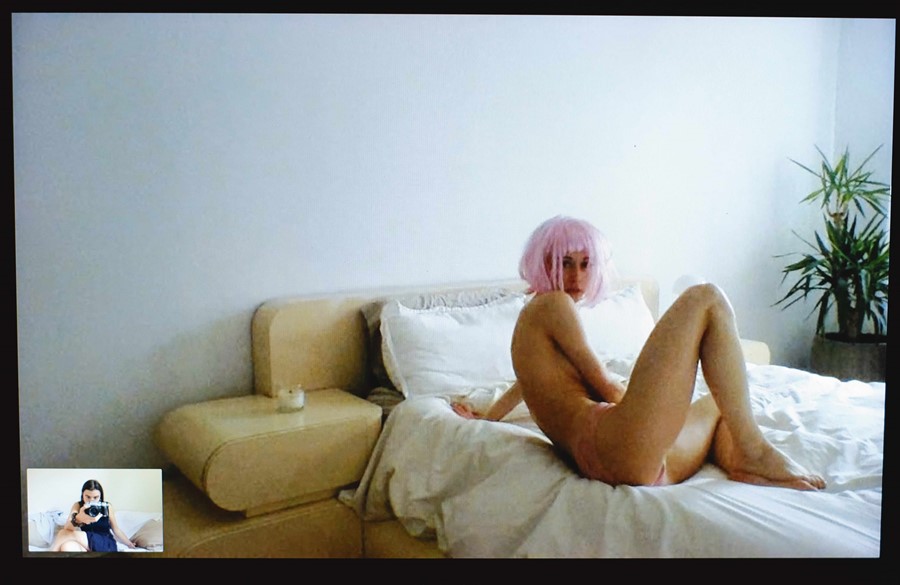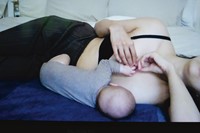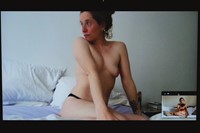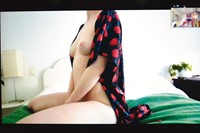Created over Zoom and FaceTime, Marie Déhé’s images of other women in their homes capture the “distant intimacy“ of the pandemic
French photographer Marie Déhé moved to London with her partner and 15-month-old daughter shortly before the world shut down in March 2020. Although her practice is deeply connected with intimacy and domestic life, Dehé yearned for the connections she established with other women through art. “I have been photographing women’s bodies, often naked, as part of an ongoing project since 2016,” she says. “I’ve always liked those moments. They always started with great conversations and created a very special bond, even if it lasted only for the photo shoot.”
Determined to cross the divide that separated her from the world, Déhé embarked on a series of photographs made over Zoom or FaceTime. “I wanted to ‘recreate’ this experience, take it further, and reflect on the idea of intimacy without being physically in the same space; how this distance will translate (or not) into images,” she says.
The result is Distant Intimacy (Art Paper Editions), which brings together photographs of nearly 30 women in their homes made between March 2020 and January 2021. Déhé’s tender images of vulnerability and strength are accompanied by quotes from the woman along with poems by writers Lien Van Leemput, who art directed the book with Déhé, and Haydée Touitou with whom she previously collaborated for the 2020 book, We Have Been Meaning To.
“Imagine our bodies and our souls out of their sight,” Déhé writes in the book. “Free from their constant stare, a never-ending judgment, from their silent pressure shrouded in our thoughts and movements, from their violence in our flesh and our dreams. We would be free.” Indeed, Déhé gives voice and vision to an image of liberation most women and femmes can often only dream of – but in doing so, makes it possible to recognise a reality we may inhabit one day. Here, Déhé reflects on her journey to create a space for female desire, care, movement, and love.
“I’ve always been interested in how photography can document one person’s life at a very special moment and thus allow us to travel through time and space. I remember being obsessed with old family photo albums at my grandma’s house and the pleasure of listening to the same stories about the pictures each time. I started using the family camera as a teen to photograph my friends at school or dressing up in our rooms, which I created to keep a memory.
“With Distant Intimacy, I wanted to create a space outside the male gaze to reflect on representation and the ways I used my own body in the photographic relationship. At the beginning, it felt more natural and comfortable to photograph friends but eventually, I started photographing women I never met before. I tried to be as spontaneous as possible and I was very open to everyone who was interested in the experience.
“My original idea was to photograph the women in their clothes and we would get undressed together but in the process, it evolved. I realised that for some women, being photographed was as revealing as being naked, or sometimes I didn’t need to be naked. Each session began with a long conversation and then the pictures. It was usually quite funny and odd when both of us had to undress. It would be like, ‘Here it is. Let’s go!’ Because I was shooting the whole screen of my laptop, I was also photographing myself in the small conversation window.
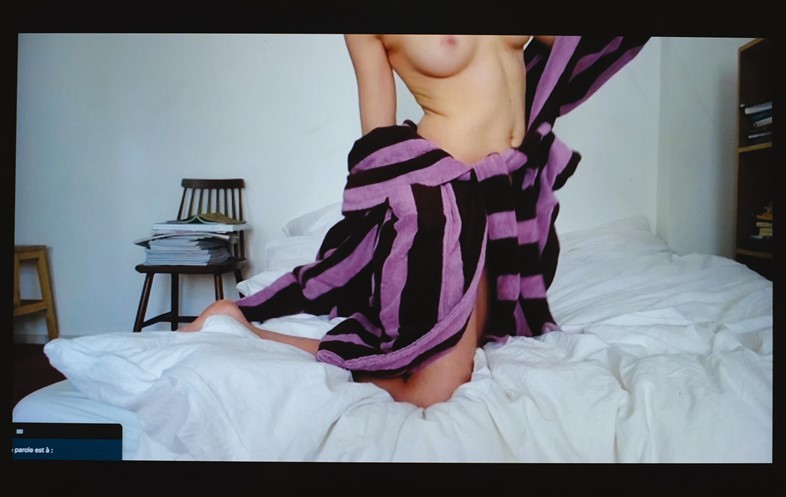
“The set-up could feel quite absurd in a way – meeting someone you know or don’t know on a conference app through a computer and getting naked doesn’t feel ‘natural’ – but I really loved working with this feeling. I never wanted it to feel forced or too set up, I just helped guide women to be themselves. The experience was so precious and I’m grateful for all the conversations and moments shared with all the women; for the trust they gave me.
“I was always surprised about their enthusiasm about being part of it and their commitment. I’m impressed by whom they are and how they decided to reveal themselves. Photography can create a safe space and a new world with its own rules of representation: showing other narratives and stories, and controlling what is shown or hidden, how and when. It gives us freedom – a space, a voice, and visibility. Because ultimately freedom is choice.”
Distant Intimacy by Marie Déhé is published by Art Paper Editions and is out now.
